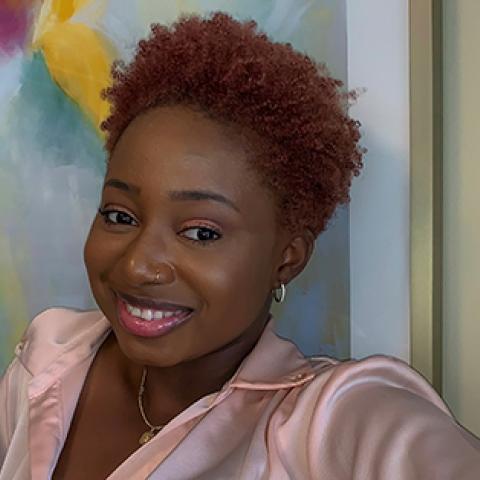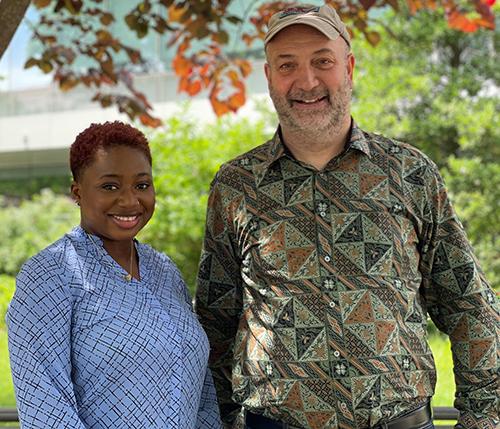
Anuoluwapo "Anu" Ajao
Anuoluwapo “Anu” Ajao is a CCR postbaccalaureate fellow who recently received a Fulbright Research Award to study personal care products and breast cancer risk in Nigerian women. After graduating from the University of Massachusetts Boston, Anu joined the Laboratory of Human Carcinogenesis under the leadership of Senior Investigator Stefan Ambs, Ph.D., M.P.H. She received support from the NIH Academy Enrichment Program, which provides funding for trainees interested in learning about health disparities. In our Q&A, Anu discusses her experience as a CCR fellow and the cancer health disparities research she will conduct this fall in Nigeria.
What sparked your interest in cancer and health disparities research?
My interests in health disparities – and medicine – have been heavily influenced by my identity as a first-generation American. My family immigrated to the United States from Nigeria in 2009, and my personal experience of poor health care that often plagues developing nations was an initial motivator.
I also became interested in this research through a health disparities enrichment program I was selected for in college. As part of the program, I worked on a project that involved adapting an intervention plan for American Indian women with prior gestational diabetes, and I learned about disparities that exist in the U.S. Following that experience, I realized that I wanted to explore this type of research more. I was already fascinated by genetic mutations and cancer mechanisms through a course I was enrolled in as a freshman, so when I decided to look for research labs to join, cancer research was one of my criteria. After graduation, I decided to expand my research knowledge and sought research opportunities, particularly those related to cancer and health disparities.
Tell us about your fellowship experience at CCR.
Working on Dr. Ambs’ team has helped me define my research interests and navigate my path. I am currently working on my application to graduate school and looking into M.D./Ph.D. programs in genetic and molecular epidemiology. This was not an area that I had previously considered, but the type of work done in our lab encouraged me to look into this aspect of epidemiology.
Learning more about cancer and the differences in molecular biology based on ancestry while working with Dr. Ambs’ group really inspired me to focus my Fulbright proposal on breast cancer within a population that is still very much understudied. I do not think I would have ever considered applying for an independent research award like a Fulbright without my experience here or the support I received.
What will you study with the Fulbright Research Award?
I will study the association between the personal use of hair relaxers and skin lighteners and breast cancer risk among Nigerian women. Both hair relaxers and skin lighteners are widely used by women across Nigeria and contain several carcinogens that have been linked to breast cancer development because of their hormone-disrupting nature. Because countries like Nigeria focus a lot of their resources on infectious diseases, cancer is still very much understudied there, and these specific kinds of exposures have not been examined in the population.
Nigerian women are more often affected by the aggressive triple-negative breast cancer subtype, and breast cancer is also more likely to present at an advanced stage in younger Nigerian women. These disturbing statistics and disparity motivated me to focus on understanding modifiable risk factors for this disease. My research will work to elucidate whether the usage of these beauty products contributes to breast cancer risk among this specific group of women.
Stefan Ambs, one of Anu’s mentors at CCR, offers his thoughts.
Anu came to our team as an NIH Academy Fellow with an aspiration to become a physician-scientist. Along with the NIH Academy, we provide training for future researchers and physician-scientists to actively engage in promoting a society in which all people live healthy lives and have equal access to health care. Anu is a prime example of the success of this curriculum. She is a resourceful and multitalented young researcher with a commitment to making a difference in underserved communities. I envision that Anu will be a very successful cultural ambassador representing the values of the NIH research community in Nigeria. (Image: Anu with Stefan Ambs; Credit: Marshonna Forgues)
